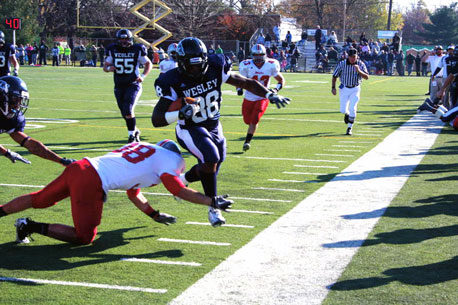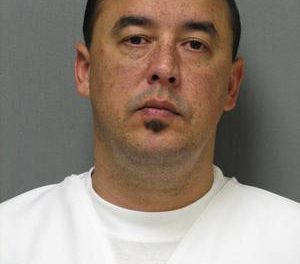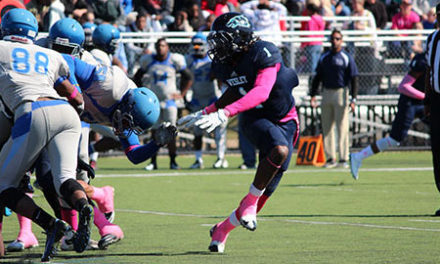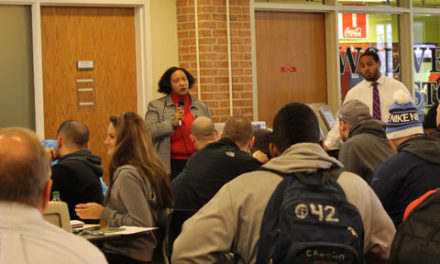By: Linnea Cavallo and Benjamin E. Lykens (Whetstone Staff Writers)
According to the NCAA rules book, everyone involved in Division III athletics of a school should be treated equally.
“The Association shall promote an atmosphere of respect for and sensitivity to the dignity of every person,†the NCAA rules state.
Many student athletes at Wesley College, however, believe that the football team does not go by this rule and gets treated better than the other sports teams.
“It’s not their fault,†said junior Richard Lober, a baseball player. “They are not asking to be treated that way. Football is just a more dominant sport at Wesley.â€
Regardless of fault, other student athletes think their teams are getting treated unfairly.
While the football team has two locker rooms – JV and Varsity – men’s soccer, baseball and tennis teams don’t have a locker room at all. There are also teams that have to share locker rooms. Some of these teams are the men’s and women’s lacrosse, softball, and field hockey teams.
“We have to be changed before practice or change in the dugout,†Lober said.
For a one o’clock game the football team is allowed a two-hour warm up time for their game. Other teams are supposed to get about an hour to warm up before games but sometimes are prevented from doing so by the football team.
During one pre-game warm-up last fall, the field hockey team, whose game was scheduled for 1 p.m., could not warm up until the football team had left the field – only 40 minutes before the field hockey game began.
“Sometimes our time to warm up is cut short because the football team is still on the field when we are supposed to get it,†said Danielle Tearl, a junior field hockey player. “But the day the football team has a game we aren’t even allowed on the field.â€
With so many fall sports, the teams must alternate practice times so that one team isn’t late all the time. But the football team seems exempt from this because it always gets the earliest practice slot.
“Sometimes we don’t have practice until ten o’clock at night,†said Kirsten Ward, junior field hockey player.
Even in the football team’s offseason, some spring sports teams deal with the issue of having the field to themselves.
During a women’s lacrosse practice this spring, some players said, football players were on the field. Before the lacrosse players could practice, the football players had to be told by the lacrosse coach to get off the field.
“They don’t respect that it’s our time and not theirs,†said Jorden Lutz, a junior lacrosse player.
Many student athletes believe that the reason the football team is treated so much better than the other teams is because head coach, Coach Mike Drass, is also athletic director.
“An athletic director should never be head coach of a sport, especially football, because it’s a whole other world in itself,†said Kimberly Fearnbach, a senior and former soccer player. “It’s a conflict of interest.â€
Another problem many other student athletes have with this treatment is the amount of attention and money that the football team receives.
“I understand that the football team is the team that brings in all of the money,†said Alyssa Prudente, senior lacrosse player. “Nevertheless, unless other teams are invested in as well they will not be able to bring in revenue.â€
This may be due to the popularity of the team among alumni.
“The football team gets donations from alumni, which makes their funding even larger to do whatever they please with it, yet teams have less meets every year because the budget is decreasing due to the hard economic times,†said Mike Mango, a resident assistant.
Players from other teams say they are frustrated by the situation.
“When will more teams have athletes who can graduate from Wesley and say that they experienced competing in the NCAA postseason?†Mango said.
This includes not only the locker room but eating at steakhouses and buffets when they’re on the road.
Punter John Smicklo said the team gets more attention because, “We are a D3 football powerhouse.â€
Wesley’s football team recruits 180 students each year, Smicklo said. They start camp on Aug. 12 and continue until the first day of classes.
During their away games, members of the team eat before and after the game – all of which is paid for by the team.
“We get $6 per player on the team after the game, which is spent on fast food,†said junior Danielle Tearle.





